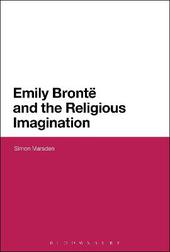
|
Emily Bronte and the Religious Imagination
Hardback
Main Details
| Title |
Emily Bronte and the Religious Imagination
|
| Authors and Contributors |
By (author) Dr Simon Marsden
|
| Physical Properties |
| Format:Hardback | | Pages:192 | | Dimensions(mm): Height 234,Width 156 |
|
| Category/Genre | Literary studies - general
Literary studies - c 1800 to c 1900
Christianity |
|---|
| ISBN/Barcode |
9781441166302
|
| Classifications | Dewey:823.8 |
|---|
| Audience | | Postgraduate, Research & Scholarly | |
|---|
|
Publishing Details |
| Publisher |
Bloomsbury Publishing Plc
|
| Imprint |
Bloomsbury Academic USA
|
| Publication Date |
21 November 2013 |
| Publication Country |
United States
|
Description
Readers of Emily Bronte's poetry and of Wuthering Heights have seen in their author, variously, a devout if somewhat unorthodox Christian, a heretic, or a visionary "mystic of the moors". Rather than seeking to resolve this matter, Emily Bronte and the Religious Imagination suggests that such conflicting readings are the product of tensions, conflicts and ambiguities within the texts themselves. Rejecting the idea that a single, coherent set of religious doctrines are to be found in Bronte's work, this book argues that Wuthering Heights and the poems dramatise individual experiences of faith in the context of a world in which such faith is always conflicted, always threatened. Bronte's work dramatises the experience of imaginative faith that is always contested by the presence of other voices, other worldviews. Her characters cling to visionary faith in the face of death and mortality, awaiting and anticipating a final vindication, an eschatological fulfilment that always lies in a future beyond the scope of the text.
Author Biography
Simon Marsden is Lecturer in the School of English at the University of Liverpool, UK.
ReviewsThis book is a welcome contribution as a thorough, theologically informed treatment of Emily Bronte's literary work ... It is clearly and accessibly written, thoroughly pursued ... and offers many perceptive insights into this writer's richly inventive and contextually aware response to religious traditions and problems. * English Studies * Marsden provides new readings of elements in Emily Bronte's work that have baffled scholars and readers: his readings of "No coward Soul" and Wuthering Heights, for example, provide a coherent analysis of seemingly irreconcilable elements of her work and thought. Marsden's is not a dogmatic reading - such a reading would run counter to Bronte's thought -- but a perceptive reading based on Christian epistemology, hermeneutics, and ontology. Marsden accounts for the religious elements in Bronte's work even as he gives full recognition to her "somewhat heterodox" or even "heretical" stance toward Christianity. * Micael M. Clarke, Associate Professor of English, Loyola University, Chicago, USA. * Marsden (Univ. of Liverpool, UK) examines Wuthering Heights and selected poems in order to engage Emily Bronte's religious position. Many biographies and critical studies--e.g., Lucasta Miller's The Bronte Myth ( 2001)--have tried to clarify Bronte's spiritual beliefs. Marsden's volume relies heavily on modern critical discourse and the support of extensive notes; there are chapter notes and an extensive bibliography. This is a book for Bronte specialists with an interest in Victorian religion. Summing Up: Recommended. Graduate students, researchers, faculty. -- S. A. Parker * Hiram College *
|